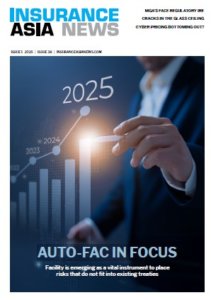Insurance Authority’s Cheung on HK’s regulatory path
July 9 2020 by Yvonne Lau- Interview
- People
- Q&A
- Hong Kong
- China
- Captives
- Belt and Road
- Greater Bay Area
- Regulatory
- Risk Based Capital
- IFRS 17

Despite the impact of recent events, from a pandemic to political tensions, Hong Kong’s Insurance Authority (IA) remains confident in the SAR’s market opportunities.
Last month, the IA’s chairman Moses Cheng acknowledged the challenges faced by the SAR. Cheng reiterated, however, that cross-border initiatives will bring “huge new opportunities” moving forward.
InsuranceAsia News (IAN) spoke with Clement Cheung, chief executive of the Insurance Authority, to find out more about the regulatory road ahead for Hong Kong.
Cheung gave insight into the IA’s progress in rolling out the new regulatory regime — and developments on the implementation of RBC and IFRS 17. He also spoke on leveraging Hong Kong’s advantages to shape the city as an ILS hub.
The Authority has been an important conduit in advocating for cross-border initiatives between Hong Kong and the mainland. Cheung offered perspective on how the regulator is helping the city prepare for its role in the Greater Bay Area (GBA) project.
InsuranceAsia News (IAN): What have been the greatest challenges in rolling out the IA’s intermediary regulatory regime?
Cheung: The IA took over from three ‘self-regulatory organisations the responsibility for direct regulation of over 120,000 insurance intermediaries in Hong Kong on September 23 2019; the scope of which covers granting licences, handling complaints, conducting inspections and investigations, and imposing disciplinary sanctions where applicable. A new team has to be established, trained and motivated to undertake this mammoth task.
As product structure and distribution channels become more complex and sophisticated, there is growing expectation among consumers for quality advice. It’s therefore necessary to elevate the educational, professional and ethical standards for insurance intermediaries which are enshrined in a set of bespoke rules, codes and guidelines. The entire suite of regulatory instruments has to go through a meticulous process of drafting, consultation and implementation.
The smooth transition is a key milestone for the insurance industry in Hong Kong that heralds enhanced talent development and conduct supervision which translate naturally into better protection of policy holders. Part of this challenging exercise also involves the commissioning of an electronic platform for licence applications, submission of returns and updating of personal particulars to be done in a paperless way.
IAN: Are there any updates on the implementation of RBC and IFRS 17 in Hong Kong?
Cheung: On the risk-based capital (RBC) regime, the third round of quantitative impact studies was completed at the end of 2019, paving way for stakeholder consultation on the draft capital rules under pillar one. In respect of pillar two’s governing qualitative aspects, the ‘Guideline on Enterprise Risk Management’ has come into effect since January 2020 which mandates the submission of ‘own risk and solvency assessment’ reports. Preparatory work on pillar three concerning disclosure will commence later in 2020.
Regarding IFRS 17, deferment of the effective date to January 1 2023 is welcomed by the industry since it allows a longer lead time to cope with transitional difficulties. We will strengthen our partnership with the Hong Kong Federation of Insurers and the Hong Kong Institute of Certified Public Accountants to assist insurers, big and small, to achieve full compliance in accordance with the stipulated timeframe.
IAN: What is the latest progress on establishing the SAR as an ILS market; and what is the potential for Hong Kong-issued catastrophe bonds?
Cheung: Coping with an accelerating pace of urbanisation and the evolving impact of climate change, institutional investors are constantly looking out for reliable tools that could transfer catastrophic risks to the capital market. This is the reason for a sustained growth of businesses generated by insurance-linked Securities (ILS), primarily driven by events in the United States and Europe.
The issuance of ILS fits well with our vision to promote Hong Kong as a global risk management centre and a regional insurance hub, particularly when set against an evolving market landscape arising from the Greater Bay Area (GBA) development as well as construction and commissioning of infrastructure projects under the Belt and Road Initiative (BRI).
In terms of GBA development, a series of policy measures announced by the Central People’s Government in November 2019 included explicit support for mainland insurers and municipalities to issue catastrophe bonds in Hong Kong. Likewise, the ‘Arrangement for Advancing Hong Kong’s Full Participation in and Contribution to BRI’ signed with China’s National Development and Reform Commission (NDRC) in December 2017 has set the tone for our strategic role.
Functioning like an offshore financial centre within the national boundary and being the largest offshore RMB centre, Hong Kong is an eminently suitable location for mainland enterprises to manage their insurance and currency risks. An amendment bill that serves to provide a platform for issuance of ILS is expected to be passed by the Legislative Council (LegCo).
For more on Hong Kong’s ILS promise, see here.
IAN: How is the IA helping prepare Hong Kong’s market for its role in the Greater Bay Area?
Cheung: A fundamental policy objective underlying the GBA development is leverage on complementary advantages to promote coordinated development. Through fostering the unimpeded flow of people, goods, capital and information, GBA will flourish as a dynamic cluster of [interdependent] cities that provides an important anchor for the advancement of BRI.
In keeping with this vision, the ‘Outline Development Plan’ for the GBA promulgated in February 2019 expounded on the role of Hong Kong that embraces facilitation services for policy holders and innovative cross-boundary insurance products.
In parallel, the IA has sustained impetus on the proposed setting up of post-sale service centres in GBA, whose practical importance is clearly demonstrated by the Covid-19 outbreak. Both of these projects are included in the package of supporting measures announced by the Peoples’ Bank of China, China Banking and Insurance Regulatory Commission and the China Securities Regulatory Commission and State Administration of Foreign Exchange in May 2020.
For more on the IA’s facilitation of GBA and BRI projects, see here.
-
Q&A: Global warming is creating uncertainty in valuation of physical assets
- September 26
Chelsea Jiang, Axa’s chief technical and innovation officer, general insurance for Greater China, shares her views on parametric, how companies can guard against convective storms, and HK’s role in narrowing China’s protection gap.
-
Q&A: Gallagher Re’s Mark Morley on renewals, inflation and pricing
- November 3
The Singapore-based APAC managing director shares his views.
-
Q&A: Swiss Re’s Mark Senkevics
- April 6
Head of P&C underwriting for Asia and ANZ on extreme flooding events in Asia, and how these can be managed going forwards.
-
Q&A: Hong Kong CIB’s chairman Alex Yip
- February 17
The broking association is prioritising professionalism and communication.
-
Allianz General | Allianz General combines innovative protection solutions while powering social good to lead Malaysian market
The insurer proactively addresses emerging risks and evolving customer protection needs while giving back to the community.
-
Sedgwick | Asia’s Energy Transformation – Balancing Growth, Risk and Renewables
Energy market presents unique risks, especially in a region which includes China and Japan as well as developing nations like Vietnam and the Philippines.
-
Beazley | Turbulent Waters: the maritime energy transition challenge
Businesses are facing a complex transition to non-carbon energy sources amid a push to achieve net-zero emissions for the marine sector by 2050.
-
Aon | Navigating shifts in the global and Asia insurance markets
Neelay Patel, Aon head of growth for Asia, says the market in Asia is at an ‘interesting stage of the cycle’.

